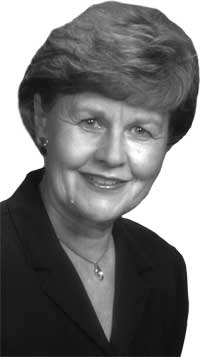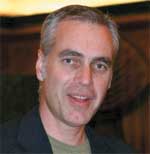
| “One Can Accomplish Anything in Three Weeks” | |
| Marla (Bullock) Kauerz ’64, P ’91, ’96 Photo courtesy of Marla (Bullock) Kauerz ’64 |
 In the autumn of 1962, I began my junior year at Colorado College. Academic life was challenging — a semester of four or five classes meeting several times a week. Student life was circumscribed by rules: family-style dinners with tablecloths and candlelight four nights a week, a strictly enforced curfew in women’s dorms with a sign-out/sign-in book. It was, in every sense, a different time and place. Yet change was in the air, in countless ways that we could not begin to imagine.
In the autumn of 1962, I began my junior year at Colorado College. Academic life was challenging — a semester of four or five classes meeting several times a week. Student life was circumscribed by rules: family-style dinners with tablecloths and candlelight four nights a week, a strictly enforced curfew in women’s dorms with a sign-out/sign-in book. It was, in every sense, a different time and place. Yet change was in the air, in countless ways that we could not begin to imagine.
That October, I remember gathering a group of students to complain to Dean Lew Worner about the volume of “stuff” we were to produce. We griped that there was too much quantity and not enough quality. I recall having 22 papers and projects due that semester. Glenn Brooks was my advisor, and I no doubt grumbled to him as well. Three days later, I was in the infirmary with an acute case of “mono.” Did I prove my point or negatemy case? I will never know.
That weekend, the Cuban missile crisis exploded into the news. Fellow political science majors came to the infirmary to share with me the rumor that Colorado Springs was the second-highest priority target because of NORAD. I went to sleep one night certain that I would die before morning — either from Russian missiles or raging mono. I didn’t much care which — I just wanted to get it over with. Both crises passed, and I went home for several weeks to recuperate. I came back to campus one week before finals, dropped only one class, and received my highest GPA to that point.
| “ | As an alumna and the mother of two CC graduates, Kristie ’91 and Jennifer ’96, I have come to believe that the Block Plan changes lives.” |
| – Marla Kauerz ’64 |
As an alumna and the mother of two CC graduates, Kristie and Jennifer ’96, I have come to believe that the Block Plan changes lives. All three of us received superior educations. My years at CC were different in virtually every way from those of my daughters. For me, the academic pace was intense but perhaps without clear focus. There was a constant struggle to determine where best to put one’s time and effort. Kristie and Jennie, on the other hand, still basically live their lives “on the Block Plan” — with focus, discipline, and the belief that one can accomplish almost anything in just over three weeks.
Freedom and Authority: An Introduction to Liberal Arts Learning
 |
| Freedom and Authority follows a Socratic model of small-group discussion that asks students to withdraw from the flow of daily life to discuss with their peers questions that have no easy answers. |
Created more than half a century ago, Freedom and Authority is the oldest interdisciplinary course at Colorado College. Its basic content remains the same as it has always been — focused on questions of personal, religious, social, scientific, and political authority. It serves now as an introduction to liberal arts learning, as a key part of the “First-year Experience” program.
Freedom and Authority is a perfect course for the Block Plan and for teaching at the Baca campus, located in the Sangre De Cristo Mountains. From its beginning, it was meant to follow a Socratic model of small-group discussion that asks students to withdraw from the flow of daily life to discuss with their peers questions that have no easy answers. This could never happen in a lecture hall, or circumscribed by a 50-minute period between ringing bells. Only on the Block Plan could we have the intense, yet flexible, course structure that allows for the open-ended exploration of ideas that makes “Freedom and Authority” possible.
Bill Davis is an associate professor and the director of comparative literature and general studies.
Here's one of 35 facts about CC:
9
Twenty majors require students to complete a senior thesis or project.
The Colorado College | 14 East Cache La Poudre Street | Colo Sprgs, CO | 80903 | 719-389-6000